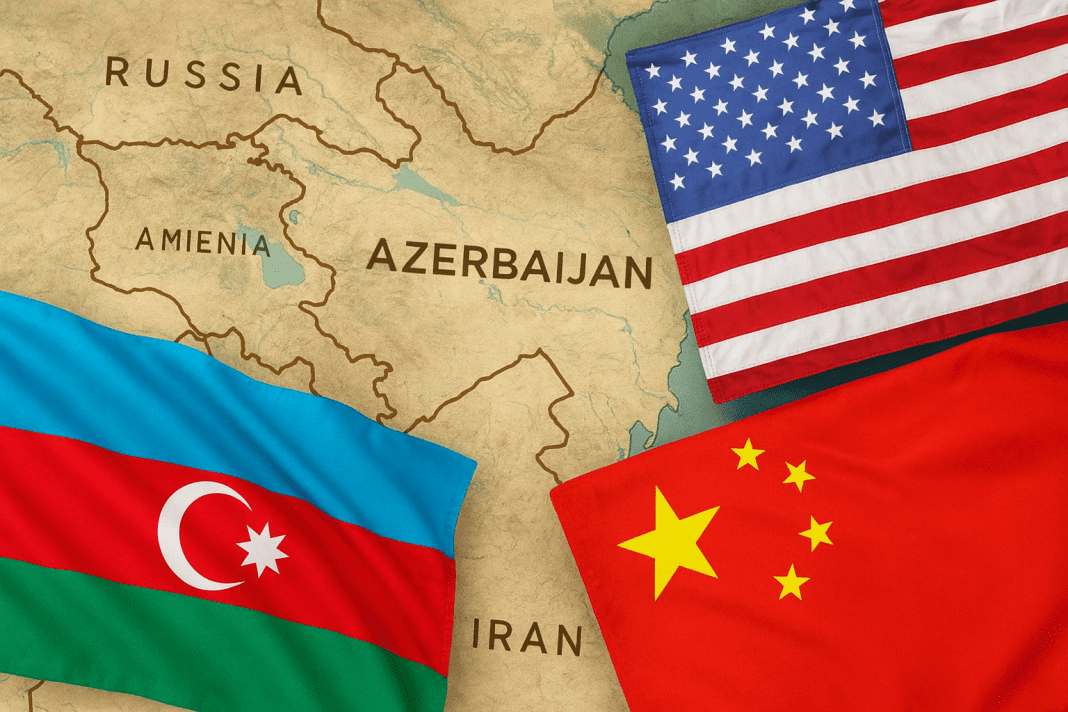Azerbaijan has emerged as a central player in the growing competition between the United States and China. Located at the crossroads of Russia, Iran, and Central Asia, this small but strategically important nation has become a focal point of global attention. Its geographic position allows it to serve as a vital land bridge connecting Europe to Central Asia, making it a key hub for trade, energy, and diplomacy.
Azerbaijan at the Heart of Eurasian Geopolitics
Recently, Azerbaijan played a critical role in a historic peace agreement with Armenia, known as the Trump Route for International Peace and Prosperity (TRIPP). Signed by the leaders of Azerbaijan and Armenia along with former US President Donald Trump, this agreement aims to create a secure corridor for trade and regional cooperation. The corridor is expected to enhance connections in the South Caucasus and expand international access to Central Asia.
Azerbaijan’s location also makes it a strategic partner against US adversaries. The country borders Iran, providing Washington with a natural ally in a region where Tehran’s influence has long been challenging. As a secular, Shia-majority state, Azerbaijan has historically opposed Iran’s Islamic Republic, although regional constraints limited its ability to act as a counterbalance. Following recent regional developments, including Iran’s setbacks in conflicts with other states, Azerbaijan now has an opportunity to strengthen its strategic role in the region.
Azerbaijan frees detained Sputnik editor after tense talks with Moscow — diplomatic thaw begins
Rising Influence of China and Declining Russian Power
China has been deepening its influence in Azerbaijan through strategic and economic engagement. Azerbaijani President Ilham Aliyev has visited Beijing twice in recent months, first in April and then in August, to elevate relations to a comprehensive strategic partnership. These visits highlight Beijing’s interest in using Azerbaijan as a link in its Belt & Road Initiative, connecting China with Central Asia and Europe via the Trans-Caspian route.
At the same time, Russia’s influence in Azerbaijan has weakened. Historically, Baku maintained close ties with Moscow, even while opposing Iran. However, the Second Nagorno-Karabakh war and Russia’s ongoing challenges in Ukraine have shifted the balance of power in the South Caucasus. Azerbaijan has become more assertive, especially following incidents such as the December downing of an Azerbaijani commercial jet over Russian territory. This has created openings for the United States to strengthen its ties with Baku while countering both Russian and Chinese influence in the region.
Bipartisan Azerbaijan sanctions review act seeks accountability for Armenian prisoners
The TRIPP corridor is central to this strategic opportunity. It provides Europe and North America with a direct route to Central Asia while also serving as a critical component of China’s trade and transport plans. This convergence of interests underscores Azerbaijan’s growing importance as a hub for global trade and connectivity, making it a key front in the US-China competition for influence in Eurasia.
Opportunities and Barriers for US Engagement with Azerbaijan
Despite its strategic importance, US engagement with Azerbaijan has been constrained by legal barriers, particularly Section 907 of the 1992 Freedom Support Act. This provision prohibits most forms of direct US government aid to Azerbaijan, a restriction originally enacted during the first Nagorno-Karabakh conflict. In the current context, where Azerbaijan has facilitated peace with Armenia, Section 907 limits Washington’s ability to fully engage with the country.
Repealing Section 907 could unlock significant opportunities for the United States in Azerbaijan. American companies could expand investments in energy, aviation, and transport sectors. Azerbaijan is a major exporter of oil and gas and could serve as a key transit route for resources from neighboring Central Asian countries like Kazakhstan and Turkmenistan. Such engagement would reduce Russia’s energy leverage in the region while offering economic and strategic benefits to the US.
Azerbaijan Charges India With Blocking SCO Membership Over Islamabad Ties
China is already leveraging similar opportunities. For instance, Beijing has supplied Azerbaijan with advanced JF-17 fighter jets through Pakistan. American firms, on the other hand, have secured major deals in neighboring countries, including Kazakhstan’s $4 billion freight locomotive contract and Uzbekistan’s $8 billion aircraft order, showing the scale of potential US investment in the region.
The growing importance of Azerbaijan in regional trade, energy, and security makes it a high-stakes arena for US-China competition. Its ability to serve as a trade corridor, energy hub, and strategic partner against regional adversaries positions the country as a focal point in Eurasia. With its recent peace initiatives, assertive foreign policy, and strategic location, Azerbaijan is no longer just a regional actor—it has become a decisive player in global geopolitics.

